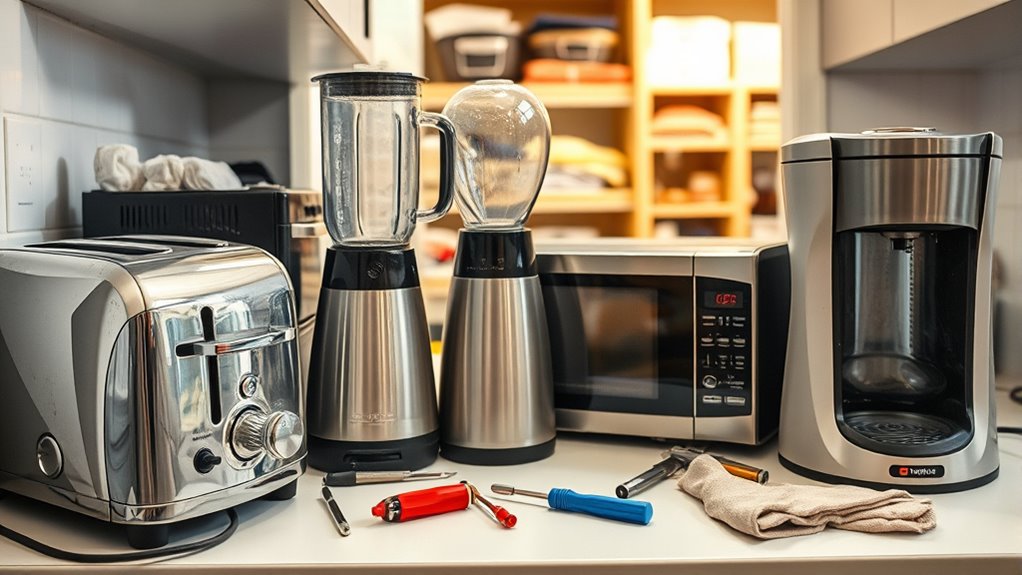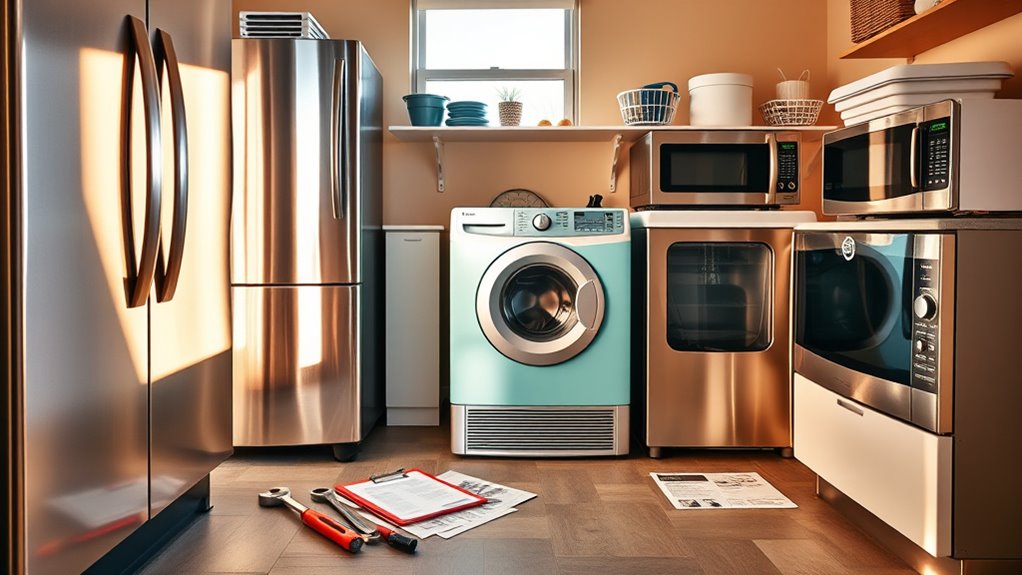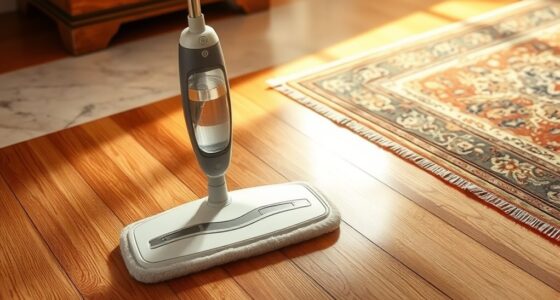An annual appliance audit helps you determine if your appliances are still efficient and safe. Check their age, look for signs of wear, and assess repair costs. If appliances are over 8-10 years old or need frequent repairs, replacing them with energy-efficient models may save you money long-term. Proper maintenance and upgrades also improve performance. Keep an eye on these factors to make smarter decisions—exploring this process more deeply will guide your choices.
Key Takeaways
- Assess appliance age and efficiency; appliances over 8-10 years or with high utility bills may need replacement.
- Perform regular maintenance, cleaning filters, vents, and coils to prolong lifespan and maintain performance.
- Consider repair costs versus replacement; frequent repairs or high costs favor upgrading to a newer, energy-efficient model.
- Upgrade to ENERGY STAR-rated appliances to improve energy savings and reduce long-term operational costs.
- Conduct an annual audit to evaluate appliance safety, performance, and determine whether to keep, repair, or replace.

Have you ever wondered if your home appliances are operating efficiently and safely? Conducting an annual appliance audit helps you answer that question while guaranteeing your home runs smoothly. The first step is evaluating your appliances’ energy efficiency. Over time, appliances can become less efficient, leading to higher energy bills and increased wear and tear. Look for signs like unusual noises, frequent breakdowns, or higher utility costs, which can indicate it’s time for maintenance or replacement. Keeping appliances clean and well-maintained is a simple yet effective maintenance tip—regularly cleaning filters, vents, and coils can extend their lifespan and improve performance. For example, a dirty dryer vent not only reduces efficiency but also poses a fire risk, so a quick cleaning can save you money and ensure safety. Similarly, defrosting your freezer periodically prevents ice buildup that hampers efficiency. When evaluating each appliance, consider its age. If it’s older than 8-10 years, it might be nearing the end of its operational life and could benefit from replacement, especially if repairs are becoming costly. Newer models often come with improved energy efficiency features, which can considerably cut your energy consumption and save you money in the long run. Additionally, incorporating proper maintenance practices can significantly boost your appliances’ longevity and performance. In addition to age, think about the frequency of repairs. If you’ve been patching up an appliance repeatedly, it’s probably more economical to replace it. Repair costs can add up quickly, and newer appliances may come with warranties that protect you from unexpected expenses. When deciding whether to keep or replace, check the energy ratings—look for the ENERGY STAR label, which guarantees higher efficiency. Upgrading appliances with these labels can boost energy savings and reduce your carbon footprint. Also, consider your household needs: if your current appliances no longer meet your lifestyle or family size, replacing them with more suitable models can enhance convenience and efficiency. Finally, remember that proper maintenance is key to prolonging appliance lifespan. Regularly inspecting for leaks, worn parts, and ensuring they’re functioning correctly can prevent minor issues from becoming major problems. Keep an eye on usage patterns and stay proactive about repairs. An annual appliance audit isn’t just about replacing old gear; it’s about making informed decisions to optimize energy efficiency, safety, and cost savings. By staying vigilant and applying these maintenance tips, you’ll keep your appliances running smoothly, save money, and enjoy a safer, more efficient home environment all year round.
Frequently Asked Questions
How Often Should I Perform an Appliance Audit?
You should perform an appliance audit annually to stay on top of your maintenance schedule and maximize your appliances’ lifespan. Regular checks help you identify issues early, decide whether to keep, repair, or replace items, and prevent costly breakdowns. By scheduling yearly audits, you ensure your appliances stay efficient and safe, saving you money and hassle in the long run. Consistency is key to maintaining a well-functioning home.
What Signs Indicate an Appliance Needs Replacing?
Think of your appliance as a trusted friend gradually losing their spark. Age indicators like frequent breakdowns, strange noises, or persistent repairs signal it’s time to part ways. Performance decline, such as increased energy bills or inconsistent results, also hints that your appliance is past its prime. If these signs stack up, replacing it will save you time, money, and frustration, keeping your home running smoothly.
How Do Repair Costs Compare to Replacement Expenses?
When comparing repair costs to replacement expenses, you find that repair cost comparisons often reveal short-term savings, but a thorough replacement expense analysis might show higher upfront costs for a new appliance. If repairs are frequent or costly, replacing could be more economical in the long run. Consider both figures carefully, weighing ongoing repair expenses against the benefits of energy efficiency and reliability of a new appliance before making your decision.
Are Energy-Efficient Appliances Worth the Investment?
Yes, energy-efficient appliances are worth the investment. They offer significant energy savings over time, reducing your utility bills and environmental impact. Plus, eco-friendly upgrades can increase your home’s value and appeal. While the initial cost might be higher, the long-term savings and benefits make it a smart choice. You’ll enjoy lower energy costs and contribute to a greener planet with appliances designed for efficiency.
Can DIY Repairs Extend Appliance Lifespan Effectively?
Yes, DIY maintenance can effectively extend appliance lifespan if you follow proper procedures and safety precautions. Regularly cleaning filters, inspecting parts, and addressing minor issues promptly helps prevent bigger problems. By doing so, you improve appliance longevity and avoid costly repairs or replacements. Just remember, for complex repairs, it’s best to consult a professional to avoid accidental damage. Consistent DIY maintenance keeps your appliances running smoothly longer.
Conclusion
Think of your appliances as the heartbeat of your home. Regular audits help you catch the silent whispers of wear and tear before they turn into a storm. By deciding what to keep, repair, or replace, you’re steering your household’s rhythm toward harmony and efficiency. Don’t let neglected appliances be the shadows lurking in the background. Take control now—your home’s symphony depends on the choices you make today.








